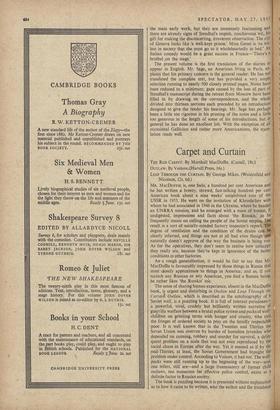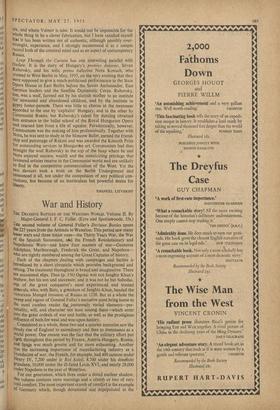Carpet and Curtain
TUE RED CARPET. By Marshall MacDuffie. (Cassell, 18s.) OUTLAW. By Voinov..(Harvill Press, 16s.) MR. MACDUFFIE is, one feels, a hundred per cent American and he has written a breezy, shrewd, fast-talking hundred per cent American book about a nine weeks' uninhibited tour of the USSR in 1953. He went on the invitation of Khrushchev with whom he had associated in 1946 in the Ukraine, where he headed an UNRRA mission, 'and he emerged with a mass of honest, if undigested, impressions and facts about 'the Russkis,' as he frequently insists on calling the people of the Soviet empire. The result is a sort of socially-minded factory inspector's report. The degree of ventilation and the condition of the drains can be clearly inferred, and things are not at all bad even though one naturally doesn't approve of the way the business is being run- As for the operatives, they don't seem to realise how unhappY they really are, because they're kept in ignorance of the better conditidns in other factories.
As, a rough generalisation, it would be fair to say that Mr. MacDuffie is favourably impressed by those things in 'Russia that most closely approximate to things in America; and as, if you scratch any Russian or any American, you find a human being' he rather likes 'the Russkis' tob.
The sense of sharing human experience, absent in the MacDuffie book, is urgent and disturbing in Outlaw and Leap Through the Curtain Outlaw, which is described as the autobiography of B Soviet waif, is a puzzling book. It is full of internal paradoxes-- a powerful, vivid, crudely but brilliantly written narrative of guerrilla warfare between a brutal police system and packs of wolf' children on grinning terms with hunger and cruelty, who raid the fringes of ordered society to prey on the timidly respectable poor. It is well known that in the Twenties and Thirties the Soviet Union was overrun by hordes of homeless juveniles who depended on cunning, robbery and murder for survival, a delin- quent problem on a scale that was not even reproduced by the social chaos in Europe after the war. Yet, it seemed as if by the mid-Thirties, at least,, the Soviet Government had brought the problem under control. According to Voinov, it had not. The wolf- packs were still running up to the beginning of the war—and, one infers, still are—and a large freemasonry of former child outlaws, too numerous for effective police control, exists as ft, definite factor in Russian society.
The book is puzzling because it is presented without explanation as to how it came to be' written, who the author and the translator are, and where Voinov is now. It would not be impossible for the Whole thing to be a clever fabrication, but I have satisfied myself that it has been written out of authentic, although possibly over- wrought, experience, and I strongly recommend it as a unique record both of the criminal mind and as an aspect of contemporary Russia.
Leap Through the Curtain has one interesting parallel with Outlaw. It is the story of Hungary's premier danseur, Istvan Rabovsky, and his wife, prima ballerina Nora Kovach, who crossed to West Berlin in May, 1953, on the very evening that they Were supposed to give a much-publicised performance in the State Opera House in East Berlin before the Soviet Ambassador, East German leaders and the Satellite Diplomatic Corps. Rabovsky, too, was a waif, farmed out by his sluttish mother to an institute for unwanted and abandoned children, and by the institute to gypsy foster-parents. There was little to choose in the treatment accorded to the one by 'capitalist' Hungary, and to the other by Communist Russia, but Rabovsky's talent for dancing obtained him entrance to the ballet school of the Royal Hungarian Opera and rescued him from a life of squalor. Paradoxically, however, Communism was the making of him professiOnally. Together with Nora, he was sent to study at the Moscow Ballet, earned the friend- ship and patronage of Rakosi and was awarded the Kossuth Prize for outstanding services to Hungarian art. Communism had thus brought the waif Rabovsky to the top of the heap where he and Nora enjoyed success, wealth and the intoxicating privilege that favoured artistes receive in the Communist world and are unlikely to find in the competitive commercialism of the West. Yet the two dancers took a train on the Berlin Underground and renounced it all, not under the compulsion of any political con- victions, but because of an inarticulate but powerful desire for liberty.



































 Previous page
Previous page